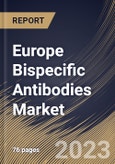The most extensively researched use of bispecific antibodies is in cancer immunotherapy particularly in lung, breast, and colon cancer. A bispecific antibody kills the target tumor cell by binding to both the target and cytotoxic cells simultaneously. Technology-advanced solutions for dual targeting methods within the same molecule include bispecific antibodies. The rapid advancement of this therapeutic discipline has been made possible by the effectiveness of BsAbs in cancer as well as noncancer programs.
Rising rates of chronic illnesses like cancer, autoimmune conditions, and infectious diseases, increasing need for targeted medicines, and developments in antibody engineering capabilities are some of the key drivers driving market expansion. People with chronic diseases and mental health disorders also represent a large share of healthcare spending, according to the Centers for Disease Control and Prevention. BsAbs offer a possible path for focused therapies in various disease areas and customized medicine to treat such illnesses.
In Europe, the mental health of numerous individuals has been hampered by the COVID-19 pandemic, which has also highlighted preexisting issues. According to a survey from the UK government, the number of cases of depression in France grew between 2010 and 2020, and people's anxiety increased at the beginning of each lockdown in the nation. All of these figures demonstrate the need for innovative treatments for these problems as well as the need for more R&D investments. Various government support programs and initiatives by major pharmaceuticals have proceeded in this direction, which will be beneficial for the expansion of the regional market.
The Germany market dominated the Europe Bispecific Antibodies Market by Country in 2022, and would continue to be a dominant market till 2030; thereby, achieving a market value of $3,194.1 million by 2030. The UK market is experiencing a CAGR of 40.9% during (2023-2030). Additionally, The France market would showcase a CAGR of 43.1% during (2023-2030).
Based on Indication, the market is segmented into Cancer, Inflammatory & Autoimmune Disorder and Others. Based on countries, the market is segmented into Germany, UK, France, Russia, Spain, Italy, and Rest of Europe.
The market research report covers the analysis of key stake holders of the market. Key companies profiled in the report include Amgen, Inc., F. Hoffmann-La Roche Ltd., Pfizer, Inc., Akeso, Inc., Johnson & Johnson (Janssen Global Services, LLC), Taisho Pharmaceuticals Holding Co., Ltd., Immunocore Holdings plc, GlaxoSmithKline PLC (GSK), Novartis AG, and Allergan PLC (AbbVie, Inc.)
Scope of the Study
By Indication
- Cancer
- Inflammatory & Autoimmune Disorder
- Others
By Country
- Germany
- UK
- France
- Russia
- Spain
- Italy
- Rest of Europe
Key Market Players
List of Companies Profiled in the Report:
- Amgen, Inc.
- F.Hoffmann-La Roche Ltd.
- Pfizer, Inc.
- Akeso, Inc.
- Johnson & Johnson (Janssen Global Services, LLC)
- Taisho Pharmaceuticals Holding Co., Ltd.
- Immunocore Holdings plc
- GlaxoSmithKline PLC (GSK)
- Novartis AG
- Allergan PLC (AbbVie, Inc.)
Unique Offerings
- Exhaustive coverage
- The highest number of Market tables and figures
- Subscription-based model available
- Guaranteed best price
- Assured post sales research support with 10% customization free
Table of Contents
Companies Mentioned
- Amgen, Inc.
- F. Hoffmann-La Roche Ltd.
- Pfizer, Inc.
- Akeso, Inc.
- Johnson & Johnson (Janssen Global Services, LLC)
- Taisho Pharmaceuticals Holding Co., Ltd.
- Immunocore Holdings plc
- GlaxoSmithKline PLC (GSK)
- Novartis AG
- Allergan PLC (AbbVie, Inc.)








